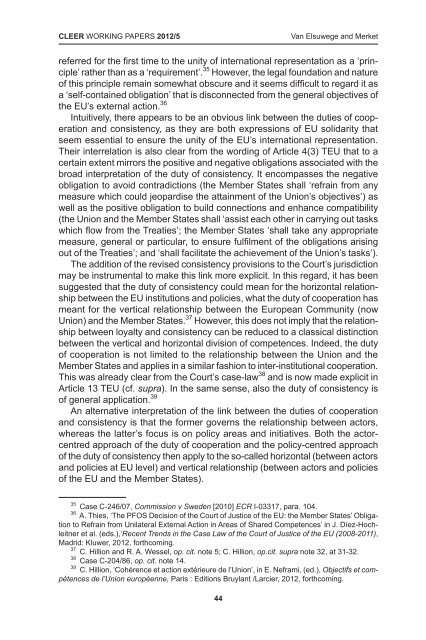Principles and practices of EU external representation - TMC Asser ...
Principles and practices of EU external representation - TMC Asser ...
Principles and practices of EU external representation - TMC Asser ...
You also want an ePaper? Increase the reach of your titles
YUMPU automatically turns print PDFs into web optimized ePapers that Google loves.
CLEER WORKING PAPERS 2012/5<br />
Van Elsuwege <strong>and</strong> Merket<br />
referred for the first time to the unity <strong>of</strong> international <strong>representation</strong> as a ‘principle’<br />
rather than as a ‘requirement’. 35 However, the legal foundation <strong>and</strong> nature<br />
<strong>of</strong> this principle remain somewhat obscure <strong>and</strong> it seems difficult to regard it as<br />
a ‘self-contained obligation’ that is disconnected from the general objectives <strong>of</strong><br />
the <strong>EU</strong>’s <strong>external</strong> action. 36<br />
Intuitively, there appears to be an obvious link between the duties <strong>of</strong> cooperation<br />
<strong>and</strong> consistency, as they are both expressions <strong>of</strong> <strong>EU</strong> solidarity that<br />
seem essential to ensure the unity <strong>of</strong> the <strong>EU</strong>’s international <strong>representation</strong>.<br />
Their interrelation is also clear from the wording <strong>of</strong> Article 4(3) T<strong>EU</strong> that to a<br />
certain extent mirrors the positive <strong>and</strong> negative obligations associated with the<br />
broad interpretation <strong>of</strong> the duty <strong>of</strong> consistency. It encompasses the negative<br />
obligation to avoid contradictions (the Member States shall ‘refrain from any<br />
measure which could jeopardise the attainment <strong>of</strong> the Union’s objectives’) as<br />
well as the positive obligation to build connections <strong>and</strong> enhance compatibility<br />
(the Union <strong>and</strong> the Member States shall ‘assist each other in carrying out tasks<br />
which flow from the Treaties’; the Member States ‘shall take any appropriate<br />
measure, general or particular, to ensure fulfilment <strong>of</strong> the obligations arising<br />
out <strong>of</strong> the Treaties’; <strong>and</strong> ‘shall facilitate the achievement <strong>of</strong> the Union’s tasks’).<br />
The addition <strong>of</strong> the revised consistency provisions to the Court’s jurisdiction<br />
may be instrumental to make this link more explicit. In this regard, it has been<br />
suggested that the duty <strong>of</strong> consistency could mean for the horizontal relationship<br />
between the <strong>EU</strong> institutions <strong>and</strong> policies, what the duty <strong>of</strong> cooperation has<br />
meant for the vertical relationship between the European Community (now<br />
Union) <strong>and</strong> the Member States. 37 However, this does not imply that the relationship<br />
between loyalty <strong>and</strong> consistency can be reduced to a classical distinction<br />
between the vertical <strong>and</strong> horizontal division <strong>of</strong> competences. Indeed, the duty<br />
<strong>of</strong> cooperation is not limited to the relationship between the Union <strong>and</strong> the<br />
Member States <strong>and</strong> applies in a similar fashion to inter-institutional cooperation.<br />
This was already clear from the Court’s case-law 38 <strong>and</strong> is now made explicit in<br />
Article 13 T<strong>EU</strong> (cf. supra). In the same sense, also the duty <strong>of</strong> consistency is<br />
<strong>of</strong> general application. 39<br />
An alternative interpretation <strong>of</strong> the link between the duties <strong>of</strong> cooperation<br />
<strong>and</strong> consistency is that the former governs the relationship between actors,<br />
whereas the latter’s focus is on policy areas <strong>and</strong> initiatives. Both the actorcentred<br />
approach <strong>of</strong> the duty <strong>of</strong> cooperation <strong>and</strong> the policy-centred approach<br />
<strong>of</strong> the duty <strong>of</strong> consistency then apply to the so-called horizontal (between actors<br />
<strong>and</strong> policies at <strong>EU</strong> level) <strong>and</strong> vertical relationship (between actors <strong>and</strong> policies<br />
<strong>of</strong> the <strong>EU</strong> <strong>and</strong> the Member States).<br />
35 Case C-246/07, Commission v Sweden [2010] ECR I-03317, para. 104.<br />
36 A. Thies, ‘The PFOS Decision <strong>of</strong> the Court <strong>of</strong> Justice <strong>of</strong> the <strong>EU</strong>: the Member States’ Obligation<br />
to Refrain from Unilateral External Action in Areas <strong>of</strong> Shared Competences’ in J. Díez-Hochleitner<br />
et al. (eds.),‘Recent Trends in the Case Law <strong>of</strong> the Court <strong>of</strong> Justice <strong>of</strong> the <strong>EU</strong> (2008-2011),<br />
Madrid: Kluwer, 2012, forthcoming.<br />
37 C. Hillion <strong>and</strong> R. A. Wessel, op. cit. note 5; C. Hillion, op.cit. supra note 32, at 31-32.<br />
38 Case C-204/86, op. cit. note 14.<br />
39 C. Hillion, ‘Cohérence et action extérieure de l’Union’, in E. Neframi, (ed.), Objectifs et compétences<br />
de l’Union européenne, Paris : Editions Bruylant /Larcier, 2012, forthcoming.<br />
44

















